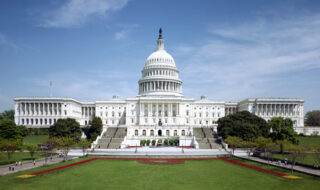Topics:
September 14, 2022
The 2022 term begins in October and will see several major cases for small business owners
Supreme Court Update: Four Major Cases for the New Term
 Sackett v. EPA
Sackett v. EPA
- On October 3, for the second time in 10 years, the Supreme Court will hear arguments in Mr. and Mrs. Sackett’s 15-year battle with the Environmental Protection Agency (EPA) over their right to build a 3-bedroom house. The EPA claims a semi-soggy portion of the Sacketts’ Idaho property is a protected wetland under the Waters of the United States (WOTUS) law.
- NFIB has been supporting the Sacketts in their legal battle since 2012, when SCOTUS first heard arguments in their case. NFIB’s brief argues that EPA’s WOTUS powers are limited to truly “navigable” interstate waters.
- Potential Small Business Impact: The decision could affect small business owners’ ability to maintain, modify, improve, or build on their land wherever water, marshes, or soggy land are or could be present in the future.
- In 2018, California voters approved Proposition 12, which imposed strict rules on the treatment of pigs and barred the sale in California of any pork produced under what the state deemed to be cruel animal standards. SCOTUS will decide whether California’s attempt to impose its animal cruelty standards on pork producers, suppliers, and farmers nationwide is an unconstitutional violation of the Commerce Clause.
- Potential Small Business Impact: Proposition 12 creates an insurmountable financial burden for small farmers, wholesalers, and retailers. NFIB’s brief argues that a failure to strike down Proposition 12 would obstruct interstate commerce, effectively allowing California to dictate consumer laws for the rest of the country.
- In Wilkins, SCOTUS will decide how much time a property owner has to sue the U.S. government in a property dispute. In this case, the U.S. Forest Service opened a portion of Mr. Wilkins’ private road to the public without telling him they had done so. When he filed suit against the government, they tried to dismiss Wilkins’ claim by arguing that he waited too long to sue.
- Potential Small Business Impact: NFIB’s brief argues that without leniency on statute of limitations, property owners will be unable to protect private property rights.
- Government agencies often try to stack as many violations of a law on small businesses as they can to pressure business owners to settle cases.
- Mr. Bittner, during his dispute with the U.S. government over a failure to report a foreign bank account, argued that agencies should avoid assigning an absurd number of violations when calculating civil penalty calculations.
- Potential Small Business Impact: NFIB’s brief argues that federal agencies like OSHA should be lenient in finding multiple statutory and regulatory violations.
Get to know NFIB
NFIB is a member-driven organization advocating on behalf of small and independent businesses nationwide.
Related Articles

July 8, 2025
AUDIO: NFIB’s Jeff Brabant Discusses BOI Repeal on SiriusXM�…
NFIB Vice President of Federal Government Relations Jeff Brabant joined POT…
Read More


July 8, 2025
NEW NFIB SURVEY: Small Business Optimism Remains Steady in June
NFIB’s Small Business Optimism Index edged down 0.2 of a point to 98.6, sli…
Read More


July 7, 2025
LISTEN: NFIB’s Josh McLeod Discusses Beneficial Ownership Rep…
Those who fail to comply would be subject to civil and criminal penalties…
Read More


July 7, 2025
LISTEN: NFIB’s Josh McLeod Discusses Beneficial Ownership…
Those who fail to comply would be subject to civil and criminal penalties…
Read More







